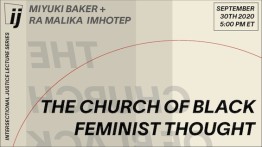The Church of Black Feminist Thought
Wednesday, September 30, 2020, 5 - 6:30pm

The founders of The Church of Black Feminist Thought speak as part of a community-wide online lecture series around the theme of intersectional justice. The event is open to current Cooper Union students, faculty, staff, and alumni. Please register online.
Remember compiling bibliographies and works cited pages to show that you did your research? Citations are the conversations that happened before now that we reference and respond to. But what if, as Black feminist geographer Katherine McKittrick asks, “citations offered advice, teachings, counseling, life, initiations, and affirmations on how to refuse systems of oppression and dehumanization?” Rather than name-dropping to claim mastery and ownership, we use Embodied Citation to flesh out the chorus that guides our critical navigation.
‘Black feminist Study’ is the love work of calling in and affirming the work of black women that have given us road maps, medicine, and questions that guide our intellectual, social, and spiritual journeys. ‘Embodied Citation’ is one of our primary methods for doing this work--a practice of learning, studying with, and being that starts with our bodies.
In this talk, Miyuki Baker and Ra Malika Imhotep will offer a glimpse at the genesis, process, and praxis of The Church of Black feminist Thought. They will collaboratively tell the story of how they came to this work, how they do this work, and why this work is important. They will introduce the concepts of ‘Black feminist Study’ and ‘Embodied Citation’. They will present and walkthrough several theory maps that offer a foundation of Black feminist world-making and/or relate to the Cooper Union series' theme of ‘intersectional justice’. Maybe they will challenge the theme of intersectional justice, or stretch it, play with it. They will offer a practice to the audience, something students can take away to deepen their engagement with the work/the world.
The Church of Black Feminist Thought is an embodied spiritual-political education project co-convened by Ra Malika Imhotep and Miyuki Baker in an effort to share citations in more accessible ways and to surface all the hidden labor done by Black feminist artists, scholars, and writers.
Miyuki Baker is a queer Zainchi artist, zinester, and scholar finishing their Ph.D. in performance studies at University of California, Berkeley. They’re currently writing their dissertation on how cross race and class change work is being enacted in East Oakland through individual and community reparations.
Ra Malika Imhotep is a Black feminist writer, performance artist, and scholar from Atlanta, GA currently pursuing a doctoral degree in African Diaspora Studies at University of California, Berkeley. Much of Ra’s intellectual and creative work tends to the relationships between queerness, Black femininity, southern vernacular aesthetics and the performance of labor in the Dirty South.
This series is co-organized by the Office of Student Affairs and Nada Ayad, Assistant Dean of HSS, as a continuation of a reading and discussion series for first-year students that was held as part of the Fall 2020 new student orientation. In the spirit of The Cooper Union mission, the Black Student Union and the Cooper Climate Coalition, along with several other Cooper students and faculty, were deeply involved in the articulation of the program as well as in contributing to the reading list and suggesting speakers.




